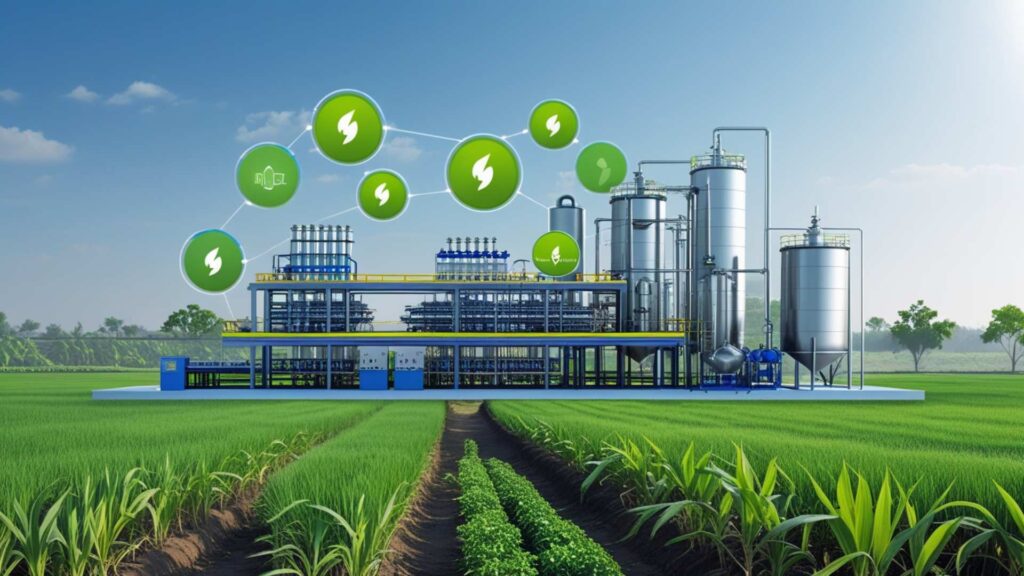Ethanol is very important for motor fuels, which has been gaining focus for the last few years due to the decarbonisation path adopted by the government. Ethanol is often used as a solvent or additive in manufacturing. It is used in the manufacture of plastics, varnishes, plasticizers, and other materials and cosmetics, pharmaceuticals, alcoholic beverages such as beer and wine.
Ethanol in India is produced as a byproduct of the sugar industry and is sourced from sugarcane. Ethanol producers use three feedstocks in India: corn, sugarcane, and wheat. Most of the major sugar producers in India have emerged as significant ethanol producers. The ethanol sector is expanding as a result of the growing need for cleaner energy sources.
In this blog, we have added the top Ethanol manufacturing companies in India. We have carefully curated the list of the top 10 ethanol manufacturers in India. We have added the company description, locations, feedstock used, achievements & contributions and other important information.
Why India is a Hotspot for Ethanol Manufacturing
Abundant Feedstock Availability
With abundant agricultural resources such as sugarcane and food grains such as maize, India is perfect for ethanol production. Despite the global price fluctuations in ethanol, ethanol manufacturing firms in India are in a very favourable situation since they receive a continuous and reliable supply of raw material, which guarantees them the ability to produce enough ethanol to cater to the ever-increasing domestic and international demand for ethanol.
Supportive Government Policies
The expansion of ethanol production all over India has been a result of the Indian government’s commitment to the Ethanol Blending Programme (EBP) that seeks to blend 20% ethanol with petrol by the year 2025. Ethanol producers in India have found it easier to invest in the requisite infrastructure and technology to deliver on this target thanks to incentives, subsidies, and regulatory support.
Energy Security and Sustainability
Ethanol is a renewable form of fuel that assists in lowering India’s dependence on crude oil imports, which is vital for the security of energy. India’s ethanol suppliers are making a major contribution to diversifying the country’s energy mix, making the nation less vulnerable to changing prices in global terms.
Environmental and Emission Reduction Benefits
Ethanol is a cleaner-burning fuel that cuts carbon emissions and air pollution against traditional fossil fuels. Indian manufacturers of ethanol are moving towards ethanol and this also helps the country to fulfill its commitment of reducing its carbon footprint and mitigating climate change.
Support for Rural Development
The expansion of leading ethanol businesses in India has generated new economic possibilities in rural areas. Such firms, in buying up surplus produce from the farmers such as sugarcane and grains, offer a stable source of income for farmers and ensure the grounding of the rural economy. This is especially critical in areas where agriculture is the main source of living.
Growing Demand and Export Opportunities
With the growing interest around the world in purchasing bio fuels, the Indian ethanol-producing firms stand to become major players in the world market. Through their increasing production capacity and technological improvements, ethanol suppliers in India are exploiting the export market, and the value they add to developing the global renewable energy milieu plays in India’s favour.
Also Read: Battery Manufacturing Companies in India
List of Top 10 Ethanol Manufacturing Companies in India
1. EID Parry

EID Parry is part of the Murugappa Group and is based in Chennai. The company is the largest sugar producer in South India. The company was founded in the year 1788. The company also became the first sugar manufacturer in India to produce ethanol from B-heavy molasses and sugar syrup at the Nellikuppam plant. It is one of the top ethanol manufacturing companies in India. The company manufactures sugar and bio products.
Locations: Nellikuppam, Pugalur, Pettavaithalai (Tamil Nadu), Sankili (Andhra Pradesh), Haliyal & Bagalkot (Karnataka).
Ethanol Capacity: Approx. 350 KLPD
Feedstock Used:
- Sugarcane juice
- Molasses
- B-heavy molasses
- Sugar syrup
Key Achievements and Contributions:
- First in India to implement ethanol production from B-heavy molasses
- Strong integration with sugar mills ensures supply efficiency
- Key contributor to the Ethanol Blending Programme (EBP)
Contact Details
- Address: Dare House, Parry’s Corner, Chennai – 600001, Tamil Nadu
- Phone: +91-44-25306789
- Email: info@eidparry.com
- Website: www.eidparry.com
2. Dalmia Bharat Sugar

It is a leading sugar producer in India. It is the biggest sugar producer in the state of Uttar Pradesh. It’s the only company in India to have manufacturing facilities in two non-contiguous states. The company has various plants in Jawaharpur, Nigohi, Ramgarh, and Kolhapur. Dalmia Bharat Sugar is one of the most diversified and sustainable ethanol producers in India.
Locations: Plants in Jawaharpur, Nigohi, Ramgarh (UP) & Kolhapur (Maharashtra)
Ethanol Capacity: Approx. 240 KLPD, expanding further
Feedstock Used:
- Molasses
- B-heavy molasses
- Sugarcane juice
Key Achievements and Contributions:
- One of the most diversified and sustainable ethanol producers in India
- Actively supports India’s Ethanol Blending Programme
- Winner of multiple sustainability awards
Contact Details
- Address: 7th Floor, Hansalaya Building, 15, Barakhamba Road, New Delhi – 110001
- Phone: +91-11-23465100
- Email: response@dalmiabharat.com
- Website: www.dalmiasugar.com
3. Balrampur Chini Mills
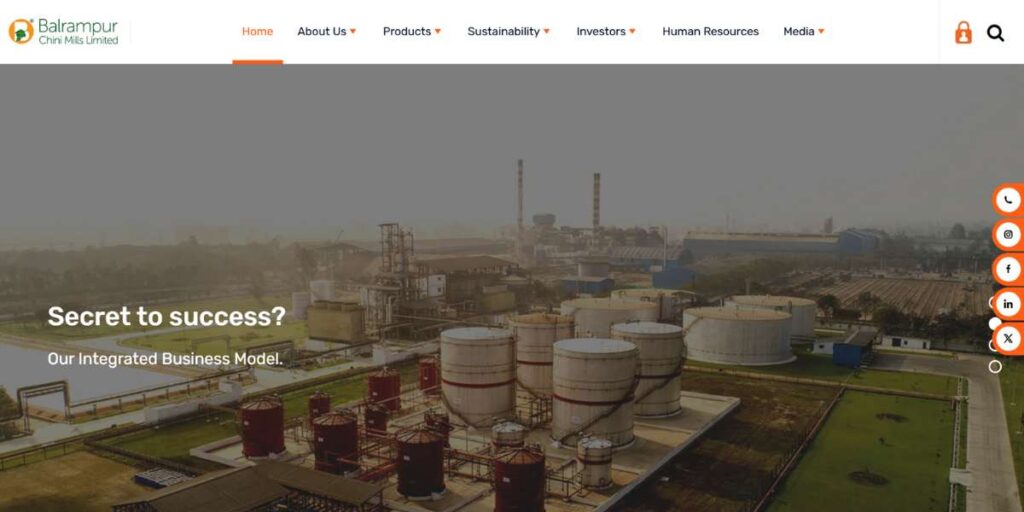
It is one of India’s largest sugar companies. It manufactures and distributes sugar, alcohol, ethanol, molasses, bagasse, and organic manure. It also generates and sells power. The company is powered by its biogas infrastructure, ensuring a sustainable production cycle. For ethanol production, the company has commissioned four distilleries in Balrampur, Babhnan, Mankapur and Gularia with a production capacity of 560 KLPD. Its large-scale and sustainable operations place it among the leading Ethanol Manufacturing Companies in India.
Locations: Plants in Balrampur, Babhnan, Mankapur, and Gularia (Uttar Pradesh)
Ethanol capacity: 560 KLPD
Feedstock Used:
- Sugarcane molasses
- B-heavy molasses
Key Achievements and Contributions:
- Fully integrated and energy-efficient production cycle
- ISO and HACCP certified facilities
- Major supplier under India’s EBP
Contact Details
- Address: 234-238, B.B. Ganguly Street, Kolkata – 700012, West Bengal
- Phone: +91-33-2210-5026
- Email: investor@bcml.in
- Website: www.chini.com
4. Dhampur Sugar Mills

It is an India-based integrated sugarcane processing company. It’s engaged in the manufacturing and selling of sugar, green energy, chemicals, and ethanol. The company has been in business for a little more than 90 years. Over time, it has emerged as one of the major players in India’s sugar sector. It has a sizeable ethanol-producing capacity and is regarded as one of the top Ethanol Manufacturing Companies in India.
Locations: Facilities in Dhampur, Asmoli, Meerganj, and Rajpura (UP)
Ethanol capacity: Over 400 KLPD
Feedstock Used:
- Molasses
- B-heavy molasses
- Sugarcane juice
Key Achievements and Contributions:
- Among the first to adopt zero-liquid discharge systems
- Significant contributor to green energy through cogenerationStrong partner of the EBP
Contact Details
- Address: 24, School Lane, New Delhi – 110001
- Phone: +91-11-30451000
- Email: corporateoffice@dhampur.com
- Website: www.dhampur.com
5. Triveni Engineering & Industries

It is one of the largest integrated sugar manufacturers in India. It’s also a market leader in various engineering businesses, spanning power transmission, water & wastewater treatment solutions, and defence. Triveni Engineering & Industries is also involved in power transmission, water solutions, and defence. It is one of the most diversified industrial players in India.
Locations: Facilities across Uttar Pradesh
Ethanol Capacity: Over 520 KLPD, targeting 660 KLPD
Feedstock Used:
- Sugarcane juice
- B-heavy molasses
- Syrup
Key Achievements and Contributions:
- Major supplier for OMCS (Oil Marketing Companies)
- Strong backwards integration with sugar operations
- ISO-certified sustainable operations
Contact Details
- Address: 8th Floor, Express Trade Towers, Sector 132, Noida – 201301
- Phone: +91-120-4308000
- Email: shares@trivenigroup.com
- Website: www.trivenigroup.com
6. Rattan Industrial India Pvt Ltd
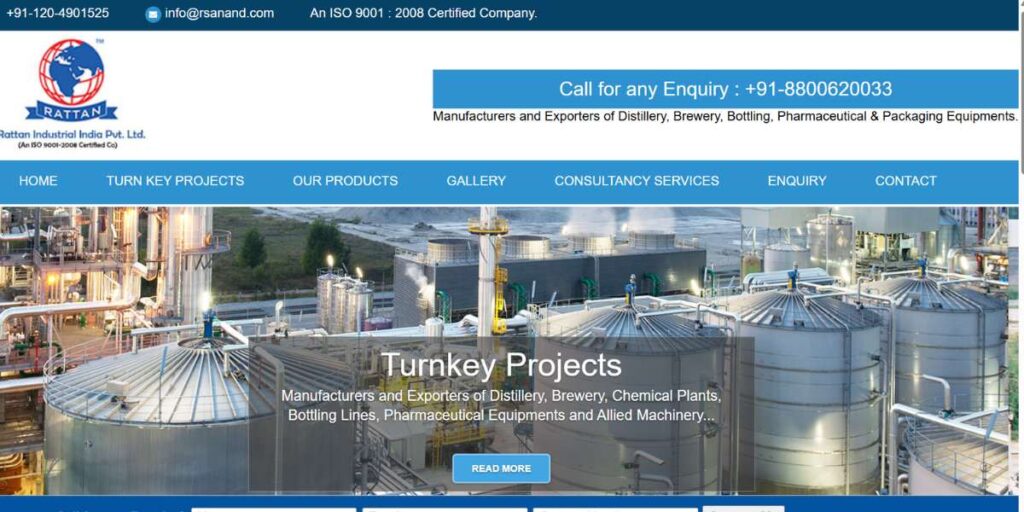
Rattan Industrial India specializes in the design, manufacture, and installation of ethanol and distillery plants across India. Although it owns a few ethanol units, its primary contribution lies in providing turnkey solutions and high-performance machinery to ethanol producers. With over 150 successful projects, the company actively supports India’s ethanol expansion through efficient and high-quality distillation systems. As a proven name in ethanol technology, Rattan plays a vital role in enabling ethanol self-sufficiency and supports the growth of Ethanol Manufacturing Companies in India.
Locations: Equipment and turnkey plant setups across multiple states
Feedstock Used:
- Molasses
- Grains (for grain-based plants)
Key Achievements and Contributions:
- Trusted supplier for ethanol plant setups in India
- Delivered over 150 ethanol & distillery plants
- ISO certified engineering and manufacturing
Contact Details
- Address: 47, Anand Industrial Estate, Mohan Nagar, Ghaziabad – 201006, UP
- Phone: 088006 20033
- Email: info@rsanand.com
- Website: www.rsanand.com
7. Bajaj Hindusthan Sugar Ltd
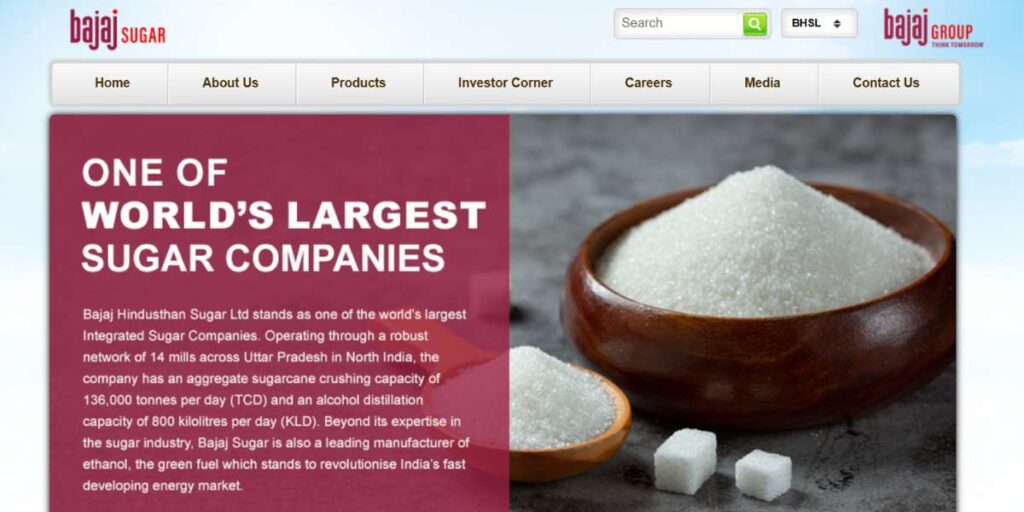
Bajaj Hindusthan Sugar Ltd, founded in 1931, is one of the largest global producers of sugar and ethanol. With 14 sugar and distillery units in Uttar Pradesh, the company stands as a key contributor to India’s Ethanol Blending Programme. Its supply chain is efficiently integrated from sugarcane crushing to ethanol production. With its massive capacity and strong R&D focus, Bajaj Hindusthan has become a trusted partner for oil companies and government blending initiatives. Its scale and capabilities place it firmly among the top Ethanol Manufacturing Companies in India.
Locations: 14 manufacturing units across Uttar Pradesh.
Ethanol Capacity: Over 800 KLPD
Feedstock Used:
- Sugarcane molasses
- B-heavy molasses
Key Achievements and Contributions:
- Among the top ethanol suppliers in India
- Strategic supplier under EBP
- Strong backwards integration and R&D in ethanol
Contact Details
- Address: Bajaj Bhawan, 2nd Floor, Nariman Point, Mumbai – 400021
- Phone: +91-22-22043606
- Email: info@bajajhindusthan.com
- Website: www.bajajhindusthan.com
8. Dwarikesh Sugar Industries Ltd
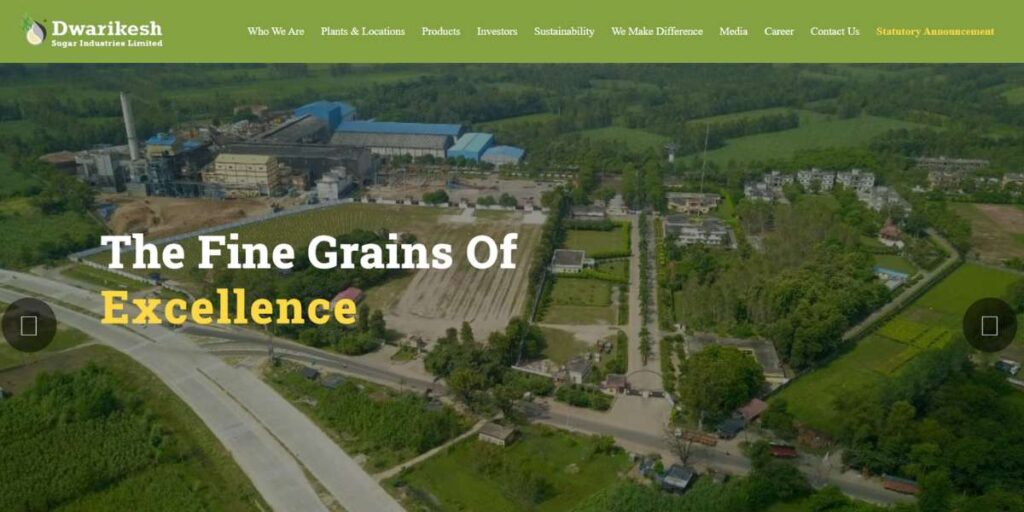
Dwarikesh Sugar, established in 1993, is a fast-emerging leader in the sugar and ethanol industry based in Uttar Pradesh. The company has focused on adopting clean energy technologies and expanding ethanol production to support India’s green fuel goals. It produces ethanol from both molasses and sugarcane juice and is known for its efficient distillation units.
Dwarikesh is a strong proponent of ESG principles, contributing actively to the Ethanol Blending Programme and India’s broader sustainability efforts. Its commitment and innovation position it among the notable Ethanol Manufacturing Companies in India.
Locations: Ethanol units in Dwarikesh Nagar, Dwarikesh Puram, and Dwarikesh Dham
Ethanol Capacity: Approx. 337.5 KLPD
Feedstock Used:
- B-heavy molasses
- Sugarcane Juice
Key Achievements and Contributions:
- High-efficiency distillation units
- Strong ESG (Environmental, Social, Governance) performance
- Key partner in India’s green fuel mission
Contact Details
- Address: Dwarikesh Nagar, Bundki, Bijnor – 246731, Uttar Pradesh
- Phone: +91-9457472345
- Email: info@dwarikesh.com
- Website: www.dwarikesh.com
9. Indian Sugar Mills Association (ISMA)
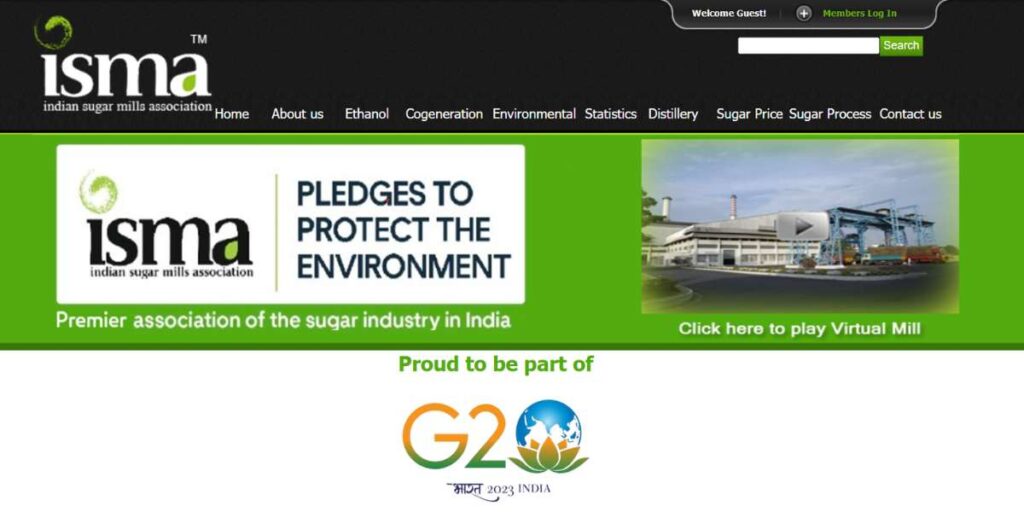
The Indian Sugar Mills’ Association (ISMA), established in 1932, is the apex body representing sugar producers in India. While ISMA is not a direct manufacturer, it plays a pivotal role in shaping policies related to ethanol, promoting industry integration, and driving research initiatives. It works closely with the Government to support the Ethanol Blending Programme, overseeing production targets, capacities, and compliance.
By championing reforms, investments, and sustainability, ISMA plays a strategic role in empowering Ethanol Manufacturing Companies in India and advancing the nation’s ethanol economy.
Key Achievements and Contributions:
- Works with the Government of India on EBP
- Tracks ethanol capacities and blending rates
- Advocates of ethanol policies and subsidies
Contact Details
- Address: Somani Building, 5th Floor, 28, Barakhamba Road, New Delhi – 110001
- Phone: +91-11-23311199
- Email: isma@isma.in
- Website: www.indiansugar.com
10. Praj Industries Ltd.
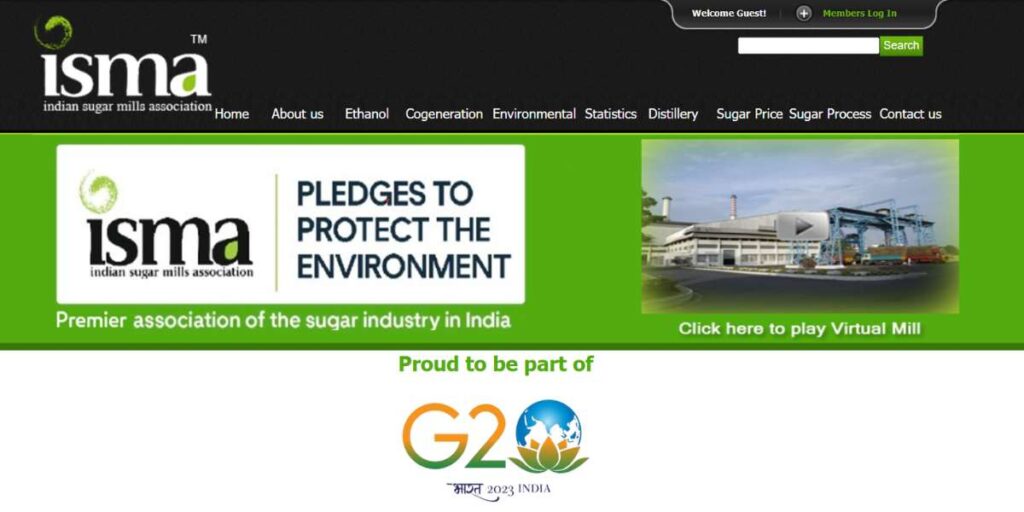
Praj Industries, incorporated in 1983 and headquartered in Pune, is a global leader in bioenergy and ethanol production technology. Although Praj is not a direct ethanol producer, the number of ethanol production plants designed and built by the company—both in India and abroad—runs into the hundreds. It provides leading-edge technology for first- and second-generation ethanol production from agricultural waste.
By enabling and partnering with many Ethanol Manufacturing Companies in India, Praj has played a pivotal role in the country’s ethanol success story through innovation, research, and sustainable engineering, making it a cornerstone of India’s biofuel revolution.
Locations: Technology provider for over 1,000 ethanol projects
Headquarters: Pune, Maharashtra
Feedstock Used:
- Sugarcane juice, molasses
- Grain
- Agricultural residue (2G ethanol)
Key Achievements and Contributions:
- India’s most advanced 2G ethanol technology developer
- Built India’s first commercial 2G ethanol plant
- Global technology provider
Contact Details
- Address: Praj Towerm Hinjawadi, Pune – 411057
- Phone: +91-20-71802000
- Email: info@praj.net
- Website: www.praj.net
Factors Driving the Growth of Ethanol Manufacturing in India
Government Policies and Support
The Ethanol Blending Programme (EBP), whose objective was to blend 20% ethanol with petrol by 2025, has been a potent elixir for growth. India ethanol producers are benefiting from financial incentives and government support, which give Indian ethanol producers a softer ride in increasing production. They have drawn both domestic and foreign investments in the sector, which has propelled its growth.
Environmental Concerns and Sustainability
Unlike fossil fuels, ethanol is becoming popular as a cleaner fuel, owing to its attendant environmental benefits, wwhich includereduced carbon emissions. India’s leading ethanol firms are getting their output in line with sustainability targets, thus guiding India toward greener sources of energy. India’s ethanol suppliers are experiencing an increased demand for renewable solutions.
Energy Security
With India’s reliance on crude oil imports, ethanol presents opportunities for Indian ethanol producers to help the country achieve energy independence. Ethanol manufacturing firms in India play a role in the reduction of the country’s vulnerability to erratic global oil prices by diversifying the energy mix.
Agricultural Benefits and Rural Development
The increase in the production of ethanol is advantageous to Indian farmers because they get a steady market for such crops as sugarcane and maize. Ethanol producers in India buy these raw materials, guaranteeing a steady income for farmers, and supporting rural economies.
Technological Advancements
Breakthroughs in ethanol production technology, including the enhanced distillation methods, have made the ethanol production business more affordable. The Indian ethanol manufacturers are able to create a superior quality of ethanol at a lower cost thus allowing ethanol suppliers located in India to meet both the local and international needs.
Challenges and Opportunities in the Indian Ethanol Industry
Challenges
- Supply Chain and Infrastructure Issues: Despite high growth, Indian ethanol manufacturing firms still struggle with the transportation and storage of ethanol. Poor infrastructure in rural areas can lead to delays and inefficiencies in the supply chain to the detriment of the production timeline and cost.
- Fluctuating Raw Material Prices: The price of major raw material such as sugarcane and maize can vary and this makes the ethanol producers in India to operate in an unstable environment. This has been especially difficult for Indian ethanol manufacturers, whose production expenses are being impacted by an increasing cost of production.
- Regulatory Challenges: Although government policies have been favorable, the changes in regulations and non-uniform enforcement from states can present obstacles for suppliers of ethanol in India. Such regulatory barriers have the potential of stifling the growth of the production capacities and making doing business for the best ethanol firms in India more challenging.
- Competition from Global Producers: In the wake of increasing global demand for biofuels, Indian ethanol manufacturers encounter competition from other ethanol-producing countries with better established infrastructure or lower production costs. This puts an incentive on ethanol suppliers in India to be innovative and improve efficiency so that they remain competitive.
Oppourtunities
- Global Market: India can become a global player in the ethanol market. When Indian ethanol producers increase production, they can exploit global markets, especially in areas where the need to reduce reliance on fossil fuels exists, thus increasing their exports and a new source of revenue.
- Technological Innovations: The continuous improvement of ethanol production technologies create plenty of opportunities for ethanol suppliers in India to increase their efficiency, lower their cost, and increase the quality of produced products. Research and development can help India lead in the next generation of biofuels.
- Government Support and Incentives: The Indian government’s renewable energy strategy provides significant opportunities to ethanol manufacturers in India. Policies such as EBP ensure long-term market sustainability and economic benefits, thus creating a business-friendly climate for investment in the ethanol business.
- Growing Homemade Demand for Renewable Energy: As environmental awareness rises and sustainable energy sources are encouraged, there is increased domestic demand for Ethanol as an alternative fuel. This presents an overwhelming opportunity for leading ethanol firms in India to match the growing demand while achieving India’s climate targets.
| Challenges | Opportunities |
| Supply Chain and Infrastructure Issues | Government Support and Incentives |
| Fluctuating Raw Material Prices | Rising Domestic Demand for Renewable Energy |
| Regulatory Challenges | Export Potential |
| Competition from Global Producers | Technological Innovations |
Conclusion
India’s ethanol industry is poised to enter a revolutionary era with government backing, escalations in environmental consciousness and the move to cleaner energy. Ethanol-producing companies in India are playing an important role in mitigating the country’s carbon footprint and in driving rural industrialisation and progress, and environmental objectives. The country’s excess agricultural resources form a firm platform for further improvement in agriculture.
In a positive regulatory background, constant improvement of the technics and higher demand for clean fuel options, India is poised to lead in the production of ethanol on a global scale. But challenges that include infrastructure gaps and varying raw material prices need to be overcome in order for the industry to reach its full potential.
With the government increasingly pushing ethanol blending rates on, the energy future of India is tbviously ethanol-dominated. The expansion of the industry will not only reduce our dependence on other countries for meeting our needs for domestic energy but will make India one of the most important players in the world market of the renewable energy.
FAQs
What are the key raw materials used in ethanol production in India?
The main input feedstocks for ethanol manufacturing in India include sugarcane and food grains such as maize and rice. Material used for producing ethanol through the fermentation process is sugarcane, and grains like maize are used for ethanol from starch.
How does ethanol blending benefit India?
Ethanol blending relieves India of crude oil dependence, reduces air pollution, and promotes sustainable development through the mitigation of greenhouse gas emissions. It also sustains rural economies through supplying an extra market for agricultural commodities.
Which are the top ethanol manufacturing companies in India?
Some of the front walnut manufacturers in India include firms such as Shree Renuka Sugars, Balrampur Chini Mills, EID Parry, and Dharmani Deni Ethanol. Such companies are leading the drive for ethanol production in the country and play have considerable role in contributing towards ethanol demand in the nation.
What is the government’s role in promoting ethanol production in India?
The Indian government has initiated programs such as the Ethanol Blending Programme (EBP), which seeks to blend ethanol by 20% with petrol by the year 2025. It also provides subsidies and financial incentives to ethanol producers to reduce their production costs and incentives to invest in the sector.

